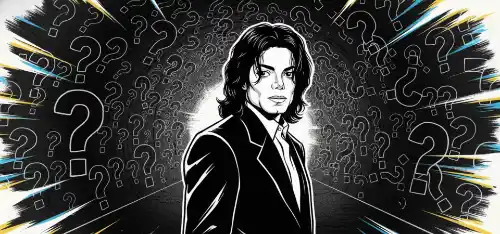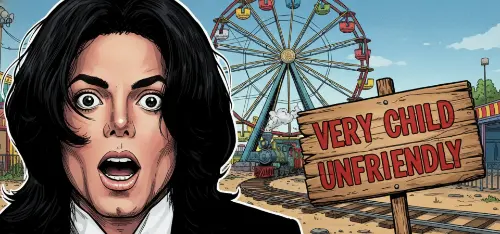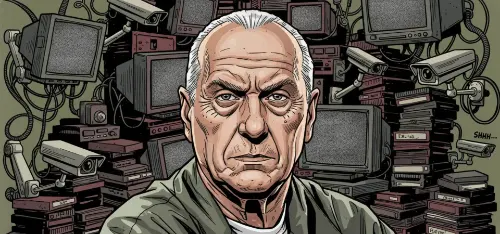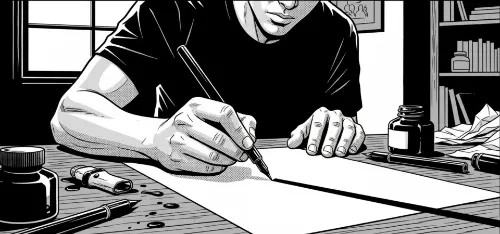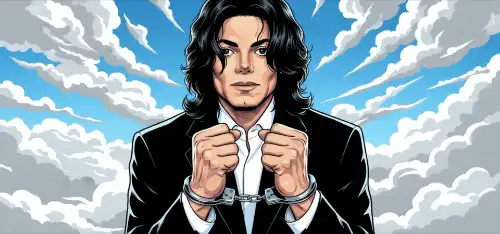Telephone Stories – A Deep Dive into the Michael Jackson Cases

June 24, 2025
Telephone Stories is a meticulously produced, 13-part podcast hosted by writer Brandon Ogborn and poet-performer Omar Crook. Available for free across platforms such as Apple Podcasts, Spotify and Luminary, the series offers one of the most in-depth explorations ever created about the allegations, legal trials, media coverage, and cultural legacy of Michael Jackson.
Each episode—averaging around 90 minutes—delves into key events and perspectives from the sprawling narrative that unfolded over more than a decade. Featuring interviews with major figures from both the prosecution and defence camps—including lawyers, FBI agents, witnesses, journalists, cultural critics and more—it constructs a multilayered portrait of one of the most polarising cases in modern pop culture.
Click on one of the links below to stream it:
Below is a chapter-by-chapter overview to provide enhanced clarity and narrative context.
1. A Suspicious Environment
The podcast opens with a deceptively simple question: What happened to Michael Jackson? Through an evocative interview with Jackson’s long-time lawyer Bert Fields, Brandon and Omar offer a glimpse of the singer at the pinnacle of fame and artistry. The turning point? A 1993 Oprah Winfrey interview that coincides with Jackson’s growing friendship with 13-year-old Jordan Chandler. What begins as a touching bond soon becomes a flashpoint for scandal that would shadow the rest of Jackson’s life.
2. Something Cosmic
Jordan’s father, Evan Chandler—a prominent Beverly Hills dentist—becomes increasingly unsettled by his son’s closeness to Jackson. What unfolds next is a tense custody battle between Jordan’s divorced parents, and eventually, allegations emerge suggesting a sexual relationship between Jackson and Jordan. This chapter explores the emotionally charged origins of the first legal case and how family conflict, media scrutiny and suspicion began to intertwine.
3. Second Star on the Right
To understand Michael Jackson’s adult persona, we must return to his beginnings. Author and critic Margo Jefferson joins the podcast to dissect Jackson’s childhood under the spotlight—from singing prodigy to global pop icon. We learn how fame, control, and family dysfunction played a central role in shaping the intensely private, and at times contradictory, figure Jackson would become.
4. Like a Ton of Bricks
When Jordan’s story gains the attention of child protective services and the Los Angeles police, Jackson’s homes are raided and the public fascination explodes into full-blown media hysteria. Meanwhile, Jackson is increasingly fragile. He cancels tour dates, reportedly due to a dependency on painkillers, and flees to Europe under mounting pressure. This episode captures how swiftly celebrity becomes vulnerability in the glare of scandal.
5. Walking Away With A Lot of Money
Jordan Chandler’s legal team puts forward damning motions. Jackson’s legal team is reshuffled. Elizabeth Taylor—one of Jackson’s most loyal defenders—takes centre stage in the media narrative. Eventually, Jackson submits to an invasive body search. Just weeks later, a massive financial settlement is announced, stunning investigators still pursuing the criminal case. What was the cost of justice, and who truly benefited?
6. A Land of Giants
Stepping back from the courtroom drama, Brandon and Omar consult two seasoned FBI profilers, Ken Lanning and Jim Clemente. They examine how child abusers often gain power by posing as generous, trustworthy adults. These "nice guy predators", they argue, are the real danger—abusers who manipulate not through fear, but through charm and perceived kindness. The insights are chilling and reshuffle our cultural assumptions about how abuse really works.
7. The Goose With the Golden Eggs
In the wake of the Chandler case, Jackson’s career falters. His reliance on prescription medication worsens, and he becomes increasingly insulated by sycophants. In a misguided PR move, Jackson grants journalist Martin Bashir intimate access to his home life. The resulting documentary not only damages his public image further but sparks a renewed police investigation—reigniting public suspicion and legal scrutiny alike.
8. Like a Brother, Like a Father
Enter Gavin Arvizo, a young cancer patient whose brief friendship with Jackson in the early 2000s becomes the centre of the second wave of allegations. The Arvizo family, already embroiled in separate controversies, are cast by the media as opportunistic and dishonest. Nevertheless, Gavin accuses Jackson of molestation—prompting yet another raid on the infamous Neverland estate and catalysing Jackson’s most high-profile criminal trial.
9. North of the Mountains
The small town of Santa Maria becomes the unlikely epicentre of global media attention as the 2005 criminal trial kicks off. Lawyers from both camps confront unprecedented legal and logistical challenges. How do you prosecute—or defend—one of the most famous and enigmatic entertainers in history? Brandon interviews those closest to the case to explore how a trial of this magnitude begins to take shape.
10. Credibility Issues
The case of The People v. Jackson gets underway with theatrical twists—Jackson arrives late to court in pyjamas, claiming injury. But the substance quickly turns serious. Defence attorney Thomas Mesereau hones in on inconsistencies in the testimonies of Gavin Arvizo and others, calling forensic experts and child psychologists into question. A pivotal ruling bars the inclusion of Jackson’s previous settlement as evidence. This episode probes a burning question: was Jackson truly the payor of the 1994 settlement, or was it handled through a corporate insurance policy?
11. It All Backfired
Prosecutor Tom Sneddon employs California’s “prior bad acts” statute to introduce past allegations and witness testimony. Former employees claim to have witnessed concerning behaviour involving Jackson and young boys, including high-profile names like Macaulay Culkin. But Mesereau undermines the credibility of each, piece by piece. When Gavin’s mother takes the stand, her erratic performance causes further damage to the prosecution’s case.
12. A Tale of Two Conspiracies
With the prosecution’s momentum crumbling, Mesereau mounts a bold defence. A parade of celebrity witnesses help recast Jackson as a generous, misunderstood figure, while further tarnishing the Arvizos’ credibility. The verdict: not guilty on all 14 counts. But behind the celebrations, questions linger. Journalists, prosecutors and insiders reflect on how close the case came to ending very differently—and what the public might never know.
13. The Music is Everywhere
The final episode follows Jackson’s life after the acquittal. Financially devastated and emotionally spent, he agrees to a series of comeback concerts. But those plans are cut short by his sudden death in 2009, caused by a fatal overdose of surgical-grade sedatives. The aftermath is riddled with tragedy—including shocking news from the Chandler family—and the release of long-awaited FBI files that do little to settle the matter. A decade later, the documentary Leaving Neverland reignites debate and legal battles. In a final twist, a long-forgotten interview with Marlon Brando reveals a private conversation that adds yet another layer of complexity to Jackson’s legacy.
Conclusion
Telephone Stories doesn’t offer easy answers or neat resolutions—but that’s precisely what makes it so compelling. Across 13 episodes, the podcast refuses to shy away from the moral ambiguity, conflicting testimonies, and raw human emotion that have long surrounded the Michael Jackson story. What emerges is not a final verdict, but a layered portrait of fame, power, justice, and the people left scarred in its wake.
